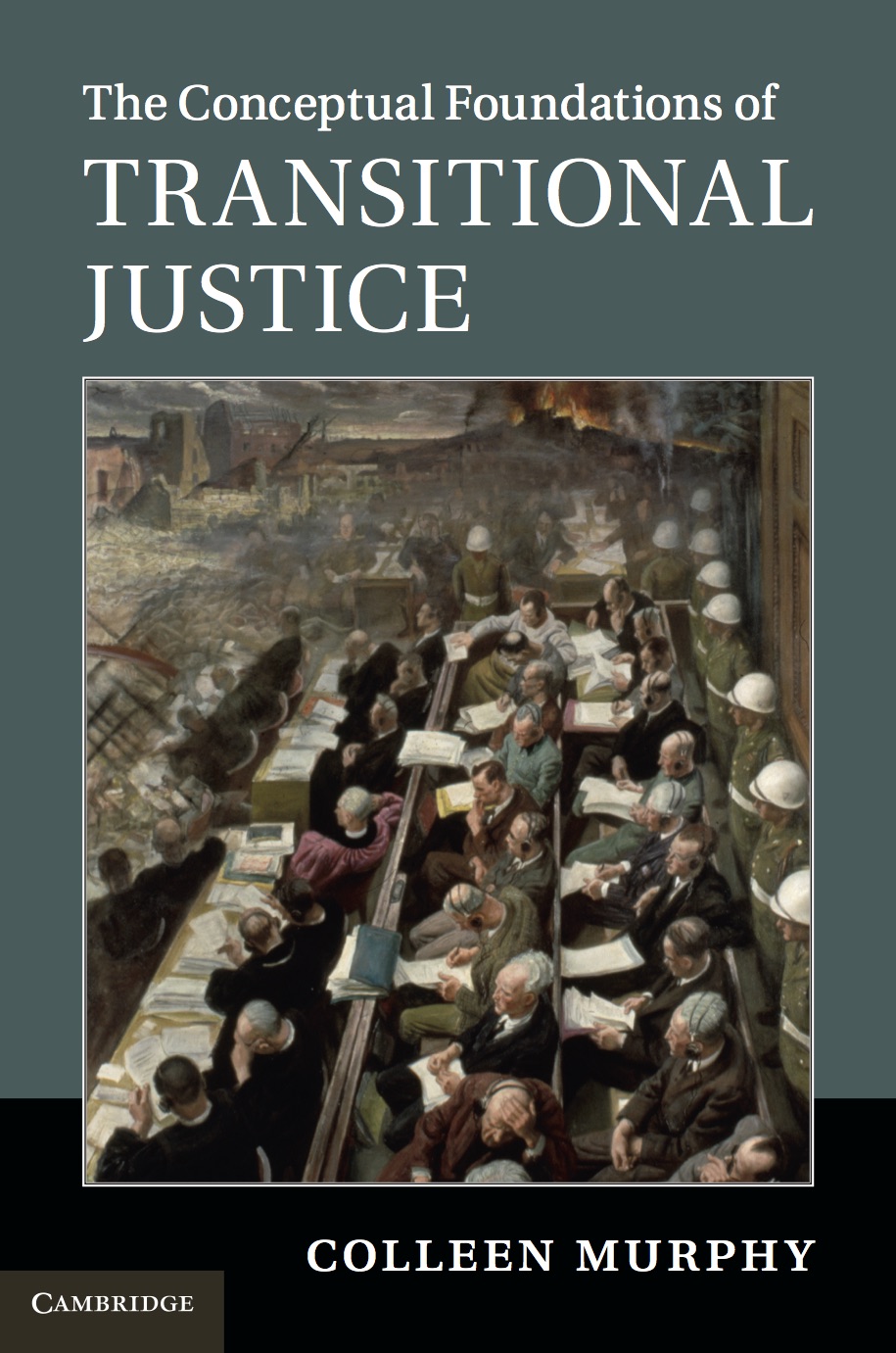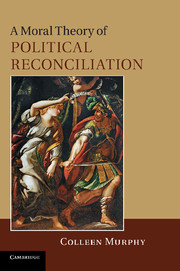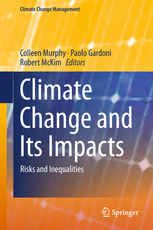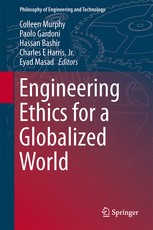Books
Monographs
The Conceptual Foundations of Transitional Justice (New York: Cambridge University Press, 2017)
North American Society for Social Philosophy 2017 Book Award

In recent decades, a number of countries emerging from long periods of repressive rule and civil conflict have attempted the difficult transition to democracy, among them South Africa following apartheid, Rwanda after the 1994 genocide, and Egypt after the Mubarak era. Though the precise markers of a successful transition to democracy are a matter of ongoing dispute, scholars and policy experts alike agree that societies must explicitly address their legacies of violence, which typically include systematic and brutal human rights abuses. “Transitional justice” refers to formal attempts by post-repressive or post-conflict societies to address past wrongdoing in their efforts to democratize. Societies in transition have turned to a range of alternate measures beyond criminal trials, such as amnesty, truth commissions, and reparations. There is little consensus, however, about which response(s) are appropriate and morally justified. At the core of such disputes is disagreement about by which standards of justice such responses should be evaluated.
I argue that transitional justice is a distinctive form of justice, not reducible to retributive, corrective or distributive justice. Drawing on David Hume’s idea of circumstances of justice, I argue that claims of justice are always context-sensitive. To understand what standards of justice apply in a particular context, you need to first understand the circumstances of justice that define that context and the problem of justice that arises given those circumstances. I then outline four circumstances of transitional justice: pervasive structural inequality, normalized collective and political wrongdoing, serious existential uncertainty and fundamental uncertainty about authority. I contrast these circumstances with the circumstances of stable democracies to which the other forms of justice apply. I claim that the question of justice in the circumstances of transitional justice is: how do you justly pursue societal transformation? This is not, I show, the problem at the core of the other kinds of justice. Societal transformation is the overarching objective of transitional justice processes; it is the reason for the sake of which such processes are undertaken. I define transformation relationally; at its core transformation is about political reconciliation. However, the pursuit of societal transformation is conditioned and constrained by the moral claims of victims and the moral demands on perpetrators of wrongdoing. Just as war can fail to be just in two ways (by being undertaken for the wrong reason and/or by being pursued in a manner that constitutes war crimes), so too can transitional justice processes fail to be just in two ways (by failing to foster societal transformation and/or by failing to treat perpetrators and victims justly).
Subject of symposium in James Stewart Blog, Journal of Global Ethics, Politeia, Social Philosophy Today
Reviews
"Colleen Murphy develops, and delivers, the bold argument that transitional justice -- the way a society reckons with massive human rights abuses -– is not ordinary justice. It is not reducible to retributive or restorative principles, nor to case-by-case determinations; rather, it is distinctive justice, because it is concerned with the just pursuit of societal transformation and relational repair. Murphy’s book is a game-changer: a must-read for anyone concerned with the theory, practice, and policy of post-conflict rebuilding." - Mark A. Drumbl, Washington and Lee University
"Murphy offers an outstanding analysis. This ambitious book constructs a novel way of conceiving the “justice” in transitional justice, provoking discussion on a topic that has received little sustained analysis in the burgeoning transitional justice literature." - Margaret Urban Walker, Marquette University
"In The Conceptual Foundations of Transitional Justice, Colleen Murphy develops a theoretical framework for understanding the conditions, objectives, and processes of transitional justice. It is a very interesting and useful contribution to the literature on transitional justice … the book helps us to rethink how we - practitioners, interested parties, and scholars - can more coherently, effectively, and justly respond to past wrongdoing." - Roger Duthie and David Tolbert, James Stewart Blog Symposium
"By reframing justice away from legal accountability and toward the evaluation of legal responses based on their contributions to reforming political relationships, between citizen and state and among citizens, she moves past the increasingly unsolvable debates that have preoccupied the field." - Laurel E. Fletcher, James Stewart Blog Symposium
"Murphy deserves accolades for traversing numerous disciplinary divides in her approach to transitional justice. For scholars seeking to build more bridges between international law and philosophy, this books offers an excellent way as to how it can be done." - Steven R. Ratner, James Stewart Blog Symposium
"Murphy eloquently argues that transitional justice is not like normal justice; it is qualitatively different because of the fundamentally distinct circumstances that constitute periods of political transition...These background circumstances mean that ordinary ideas of retribution, corrective justice, and restitution do not cater to the needs of societies undergoing transition from authoritarianism/mass violence to democracy/peace. The misfit with these usual concepts of justice is so acute that we must craft an entirely new, distinct brand of justice that follows its own logic and answers to its own self-consciously defined first principles." - James Stewart, James Stewart Blog Symposium
"...the book is a sophisticated and analytic account of a timely topic, and merits a careful read by those with an interest in the challenges of transitioning from injustice to justice in circumstances that make the transition, without good guidance of the kind Murphy offers, seem impossible to achieve." - Patti Lenard, Notre Dame Philosophical Reviews
"Murphy’s accessible and engaging book provides a normatively clear and philosophically rigorous theory of transitional justice that is a valuable contribution to a burgeoning literature on a complex moral and political subject. … its clarity helps to illuminate where future philosophical work on this complex theme should go." - Catherine Lu, Criminal Law and Philosophy
"Colleen Murphy’s new book on transitional justice displays her signature blend of analytic rigor, elegant writing and empirically anchored theorizing. She follows up her excellent first book on political reconciliation with a volume on what it means to transform a war torn society so that it can, ultimately, become reconciled. The just pursuit of political transformation, Murphy argues, is at the heart of the idea of transitional justice. This is the best, most ambitious philosophical account of transitional justice that I have read. The book can be read with great utility by scholars and students seeking to understand the unique conditions and dilemmas surrounding transitions, as well as by policy makers interested in fashioning decent and legitimate transitional institutions." - Nir Eisikovits, Ethics
"This book will be very useful to those who are interested in post-conflict rebuilding, conflict transformation, and reconciliation. The author asks us to reconsider conventional ideas about transitional justice and to focus on the role that relational change can play in it. Although Murphy’s research needs to be fully contextualized to establish its relationship with ideas explored in other relevant literature, this book will help theorists and practitioners to comprehend the complex yet unsolved relation between 'doing justice' and 'social transformation' in transitional societies." - Kang Hyuk Min, Journal of Conflict Transformation and Security
"The Conceptual Foundations of Transitional Justice advances this work in important ways, by developing a bold case for the importance of transitional justice. The book is a rewarding intellectual journey, and offers a provocative framework for transforming theory and practice." - Bronwyn Leebaw, Perspectives on Politics
"In a combination of rigorous theories and brilliant analytical writing, [Murphy] argues that the just pursuit of societal transformation is the essential heartbeat of transitional justice." - Baligh Ben Taleb, Historical Dialogues, Justice, and Memory Network
"The suggestion that transitional justice is not uniquely concerned with the well-documented struggles of Africa or South America, but also offers a stance from which states normally taken as paradigms of justice may be criticized, is among the many interesting features of this fascinating and important book." - Stephen B. Hawkins, Dialogue: Canadian Philosophical Review
A Moral Theory of Political Reconciliation (New York: Cambridge University Press, 2010)

Political reconciliation is one of the most important and controversial challenges for societies in transition from repressive rule or civil war to democracy. My analysis of political reconciliation specifies what the process of rebuilding political relationships entails and its moral significance. The central thesis I defend is that the rebuilding of political relationships is a complex process involving the cultivation of mutual respect for the rule of law, reasonable political trust, and central relational capabilities. The rule of law, reasonable trust, and support for capabilities represent distinct ways that political relationships can express reciprocity and respect for moral agency. Thus their erosion in contexts of civil conflict and repressive rule is morally troubling, I maintain, because political relationships premised on these moral values are undermined.
Subject of symposium in Criminal Law and Philosophy
Reviews
"What is needed for the reconstruction of political relationships in societies that have been torn apart by deadly conflicts? Colleen Murphy has answered this question in a path-breaking book that is essential reading for anyone concerned to understand the rule of law and the place of trust in our shared social lives." - Alasdair MacIntyre, University of Notre Dame
"A Moral Theory of Political Reconciliation is far and away the best treatment of political reconciliation in a growing literature on this hot topic. Murphy has mastered this literature, distilled it, and set it off against her own views, which, to my mind, are better than the extant views. I would single out her discussion of the concepts of reconciliation, rule of law, and trust, as especially meritorious; I learned an enormous amount from them. The book is a tour-de-force, setting out a new way to think of reconciliation and arguing at length against all of the major alternative approaches." - Larry May, Vanderbilt University
"....Murphy's book offers a great deal to readers interested in the political philosophy of reconciliation. The discussions of the rule of law, political trust, and the general framework for reconciliation in particular are rich and insightful. Moreover, the book helps to fill an unfortunate gap in the literature on reconciliation by offering an extended systematic political philosophical account of reconciliation that is analytically sharp and morally insightful. It thereby helps us to understand better the moral issues in political reconciliation, and, I expect, will help to repair the shameful dearth of philosophical attention given to these matters by encouraging other political philosophers to think carefully about them." - Darrel Moellendorf, Ethics, vol. 122, no. 1 (2011), pp. 198-203
"....This is a well-argued analysis of some of the damage that civil conflicts and repressive governments do to political relationships, especially in postauthoritarian transitional societies...." - Stephen L. Esquith, Perspectives on Politics, vol. 9, no. 2 (2011), pp. 418-420
"Colleen Murphy provides us with an original, nuanced, well-written and analytically incisive diagnosis of how political relationships fail and what it takes to fix them. This is an important and timely book furthering both our understanding of what counts, normatively, as a healthy polity and what can be done practically to nurse war-torn communities back to health.... The book is a display of analytic political philosophy at its best, seamlessly blending the normative and practical aspects of post war repair. It is sure to become a central text in the growing literature in this field." - Nir Eisikovits, Human Rights Quarterly, vol. 34, no. 4 ( 2012), pp. 1211-1214
"For anyone interested in a critical, practical, and political exploration of reconciliation, Colleen Murphy’s book is a wonderful resource. It is a fast-paced and well-written book that compels the reader to keep going. And, it is useful in the everyday world." - Val Napolean, Jotwell (http://equality.jotwell.com/one-engagement-moral-theory-of-political-reconciliation/)
"A Moral Theory of Political Reconciliation offers theorists and practitioners of reconciliation a wealth of thoughtful insights and useful theoretical tools for navigating the murky waters of post-conflict repair. It also invites us to rethink the nature of political relationships more generally, both as they ought to be and as they fall away from this ideal. Finally, Murphy’s desiderata for a theory of political reconciliation and her own answers to those desiderata raise the bar for future philosophical interventions." - Alice MacLachlan, Transnational Legal Theory, vol. 3, no. 1 (2012), pp. 95-100
"Murphy succeeds in fashioning an ethic that conceives and addresses the problem of political reconciliation as a whole. Her development and deployment of the rule of law, trust, and capabilities is creative and rigorous. Her book will likely stand as a major position in the developing literature on the ethics of addressing past injustices in pursuit of more just political orders… a masterful treatment of the vexing subject of political reconciliation." - Daniel Philpott, Journal of Moral Philosophy, vol. 10, no. 2 (2013), pp. 227-230
"Both texts deliver an original insight into and comprehensive account of the collapse and restitution of political relationships, which will be of interest to philosophers, legal scholars, policy analysts and all those who are interested in transitional justice, democracy, and global politics and international relations. The books are setting out a new way of thinking about reconciliation, and potentially could be used both as a classroom textbook and as a means for advancing the political reconciliation discourse." (joint review of my book and Nir Eisikovits, Sympathizing with the Enemy”) - Olivera Simic, Griffith Law Review, vol. 21, no. 3 (2013), pp. 809-811
"Murphy […] dedicates a considerable portion of her book to enabling a greater understanding of the relationship between the individual/groups and the state/officials through a meticulous examination of the manner in which the constitutive elements of political relationship, such as trust and capabilities, are damaged by civil conflict and repressive rule and by illustrating what transformed and rebuilt relationships should look like." - Ambika Satkunanathan, International Journal of Transitional Justice, vol. 8, no. 1 (2014), pp. 171-181
"...over the past quarter century philosophers have developed analyses of forgiveness, mercy, pardon, reconciliation, atonement, and other collective responses to wrongdoing in an attempt to make sense of morally appropriate political responses to them. Colleen Murphy’s A Moral Theory of Political Reconciliation (Cambridge, 2010) is an important and thoughtful contribution to this literature […] Murphy’s remarks on the nature of reciprocity and respect for moral agency, and the role of group identity and history in effecting successful political transitions are insightful and compelling." - Paul Hughes, Mind, vol. 124 (2015), pp. 663-668
Edited Volumes
Climate Change and Its Impacts: Risks and Inequalities (Springer, 2018)

Climate change is one of the most important and pressing global challenges for the international community. The aim of the chapters is to articulate the ways that climate change is affecting society by altering weather patterns, modifying risks such as those from natural hazards, and exacerbating inequalities as well as creating new inequalities among individuals and communities around the world. The basic premise of the volume is that successful climate change management requires the technical expertise of engineers and scientists; the legal, cultural, political, environmental and economic expertise of social scientists and legal scholars; and the ethical expertise of philosophers.
Risk Analysis of Natural Hazards (Springer, 2015)

Natural hazards can have a devastating impact on society. They cause billions of dollars of damage each year, kill thousands, and render millions homeless, and their frequency and severity are expected to increase with climate change. Although the source of damage from natural hazards may appear to be “natural,” in fact it results from complex interactions between the natural environments, human decisions about the built environment, and social vulnerability. This volume brings together leading minds in engineering, science, philosophy, law, and the social sciences to develop a deeper understanding of the interdisciplinary challenges involved in the mitigation of natural hazards. Parts I and II of this value explore risk assessment, first by providing an overview of the interdisciplinary interactions involved in the assessment of natural hazards, and then by exploring the particular impacts of climate change on natural hazard assessment. Part III discusses the theoretical frameworks for the evaluation of natural hazards. Finally, Parts IV and V address the risk management of natural hazards: Part IV provides an overview of the interdisciplinary interactions underlying natural hazard management, and Part V explores decision frameworks that can help decision makers integrate and respond to the complex relationships among natural events, the built environment, and human behavior.
Engineering Ethics for a Globalized World (Springer, 2015)

The overarching purpose of the edited volume is to identify, discuss and begin to address the wide array of ethical issues that have emerged for engineers due to the rise of a global economy. The world today is witnessing an unprecedented demand for engineers and other science and technology professionals with advanced degrees due to both the off-shoring of western jobs and the rapid development of non-Western countries. To date, there has been no systematic treatment of the particular challenges globalization poses for engineering ethics standards and education. This volume concentrates on precisely this challenge. Scholars and practitioners from diverse national and professional backgrounds discuss the ethical issues emerging from the inherent symbiotic relationship between the engineering profession and globalization. Through their discussions a deeper and more complete understanding of the precise ways in which globalization impacts the formulation and justification of ethical standards in engineering as well as the curriculum and pedagogy of engineering ethics education emerges.